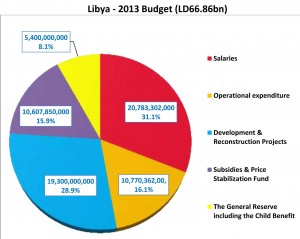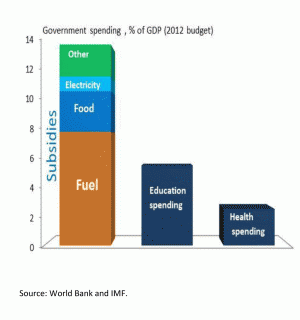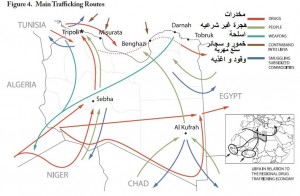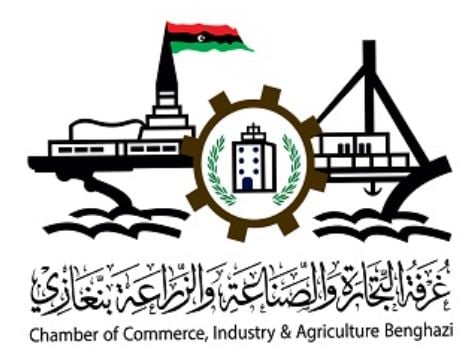By Sami Zaptia.
Tripoli, 9 March 2014:
The Head of the GNC Budget, Finance and Planning Committee Mohammed Abdullah revealed that . . .[restrict]the 2014 budget is estimated to be LD 68.59 billion with huge increases in the salaries and subsidies sections.
Abdullah said that inflation in public expenditure will lead to “a financial crisis” in light of the oil ports closure and resultant decline of state revenues.
According to a report from the Central Bank of Libya (CBL), actual expenditure for 2013 had reached LD 67 bn, the GNC member explained. This contrasts to a press release by Prime Minister Ali Zeidan in early February in which he claimed his government had only received in its accounts LD 50.48 bn.
Although Zeidan said in the same statement that there were LD 2.1 bn of reserves and that there were “a few billion” still unspent in Ministry accounts, there has not been an adequate explanation by either side of where the shortfall of most of the LD 16 bn is.
This disparity led to the GNC making a statement saying that it is studying the different figures it had received from the CBL and the government.
Speaking at a press conference at the end of February, GNC member Abdullah said that oil revenues from 1 January until 24 February had declined, reaching a low of LD 1.67 bn. In contrast, in 2013 Libya had on average an oil revenue of over LD 5 bn per month.
Abdullah had added that an LD 3.79 bn state deficit had already been recorded in the same period.
He clarified that the state is facing a liquidity crisis due to lack of revenues to cover state obligations in comparison to low state revenues and the increase of public expenditure, adding that this “will lead to a very big risk”.
The scale of this “crisis”, as GNC member Abdullah put it, was made clearer when the Abdullah revealed some details of Zeidan’s proposed LD 68.59 budget for 2014. In 2013 salaries accounted for 31.1 percent (LD 20.78 bn) and subsidies accounted for LD 15.9 percent (10.61 bn) of the LD 66.86 bn budget.

In the proposed 2014 budget, salaries are expected to account for LD 27.14 bn and subsidies LD 15.32 bn. These increases mean “a very big risk in light of the oil ports closure”, said Abdullah.
|
Salaries |
Increase / decrease 2013/14 |
Subsidies |
Increase / decrease 2013/14 |
|
|
2013 budget LD 66.86 bn |
LD 20.78 bn (31%) |
LD 10.61 bn (16%) |
||
|
2014 budget LD 68.59 bn estimate |
LD 27.14 + (40%) |
LD 6.36 bn + (30%) |
LD 15.32 + (22.%) |
LD 4.71 bn + (44%) |
Based on these figures reported by the GNC member, we can see that the salaries section of the 2014 budget will increase by LD 6.36 bn or 30 percent compared to 2013. Equally, subsidies are going to increase by LD 4.71 bn or 44 percent compared to 2013.
Abdullah said that “According to assumptions, the 2014 budget should not exceed LD 60 bn”. He did not elaborate as to what exactly he had meant by assumptions.
“The budget is still under discussion by the GNC and the Central Bank of Libya has transferred LD 5.3 bn to the state account early this year in order to cover state obligations”, he concluded.
In 2013 the development and reconstruction sector of the budget was LD 19.3 bn or 28 percent of the whole budget. Moreover, all three sectors of the 2013 budget; operations, development and reserves totaled 53 percent of the total budget.
Given that the 2014 budget is estimated at LD 68.59 bn and we are informed that the salaries and subsidies sections will account for 40 percent and 22.3 percent, this will only leave 38 percent (or 25.85 bn) of the total budget for the remaining three sectors. This compares to LD35.5 bn in 2013.
This may reasonably indicate that the development and construction sector, which was allocated LD 19.3 bn in 2013 will have less allocated to it in the 2014 budget.

This could be bad news for all the international companies involved in Libya’s construction sector. It would also be bad news for Libya as there will be no attempt to get the huge infrastructure projects going, which would have offered diversification of revenues, growth and job creation away from the now stalled hydrocarbon sector.
It would also be displeasing to hear to the World Bank and IMF who have persistently urged Libya to control spending on salaries and subsidies at the expense of the development sectors of the budget such as construction, education and health.
This issue was raised as a concern in the World Bank’s January MENA Quarterly Economic Brief.
In that report, the World Bank noted that “in September 2013 the (Libyan) government announced a 20 percent increase in salaries for public-sector workers and issued a separate decision to raise the wages of Judicial Council staff”.
This double effect of reduced revenues and increased wages has led the World Bank to revise “its estimates for the fiscal stance of the government in 2013 and 2014. It is expected that the fiscal surplus of 2012 will turn into a deficit of about 5 percent of GDP for 2013 and 4 percent of GDP for 2014 respectively.
The large current account surplus” that Libya had enjoyed for years ”is also expected to fall sharply and reach near zero in 2013 and recover only slightly in 2014?, the World Bank explained.
“Under the current situation, the government has had to dig deeper into its large stock of foreign reserves, which stood at $124 billion at end 2012, to finance its budget deficits in 2013 and 2014?, the report explained, adding that ”between $10 and $13 billion have already been used in 2013?.
The World Bank (and indeed the IMF) have been repeatedly raising concerns about subsidies in successive reports, advising the streamlining of “general subsidies (estimated at 11 percent of GDP in 2013) and public-sector wages that impose fiscal pressures on the government”.
“Subsidies are high and reduce the fiscal space available for spending priorities on health, education and investment in infrastructure”. In other words, the report is highlighting the fact that revenue spent on subsidies and wages is not being spent on development projects and sectors that have the potential to earn Libya other non-hydrocarbon revenues, and create more employment.
Ali Zeidan’s proposed 2014 budget seems to totally disregard the World Bank and IMF advice.
There is also another sinister effect of Libya’s bloated goods subsidies. The United States Institute for Peace (USIP) published a report in February showing how illicit trade in Libya was driving crime and instability in transitional Libya. This illicit trade was to a large degree funded and driven by Libya’s subsidized commodities of fuel and staple foods such as flour, sugar, oil pasta etc.
The study recommended that a “transition from cash payouts and commodity subsidies to sustainable economic opportunities” be put into effect as a measure to counter the growth of illicit trade and the resultant growth of crime and instability.

If we are to accept the assumptions and conclusions of the USIP study, then we can only conclude that an increase in the subsidy section of the Libyan 2014 budget by LD 4.71 bn can only be likely to add to the volume of illicit trade, crime and political instability in Libya.
It is worth keeping in mind, however, that the budget proposal put forward by Prime Minister Ali Zeidan may not necessarily be accepted by the GNC which may choose to impose changes on the Prime Minister prior to approving his 2014 budget request.
This scenario is made even more likely in view of the persistent attempts by GNC members to remove Prime Minister Ali Zeidan from office as well as the likelihood that there could be elections to replace both the GNC and the Prime Minister by the middle of 2014.
This fact was tacitly acknowledged by Prime Minister Ali Zeidan when he had confirmed to Libya Herald at a press conference in March that he had only proposed a six month budget to the GNC.
On another level, it is also worth noting that the GNC has formed a Budget Crises Management Committee, which includes the GNC head Nuri Abusahmain, the CBL Governor Sadik Elkabir and GNC Budget, Finance and Planning Committee head Mohammed Abdullah.
This committee is discussing the various ways in which to solve the problem of decreased national revenues due to the oil ports blockade in eastern Libya by the purported federalist Ibrahim Jadran.
[/restrict]










